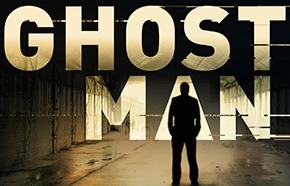Extracts
Extract: Ghostman by Roger Hobbs
Ghostman is the début novel from Roger Hobbs and has been published in sixteen countries around the world. This gripping story picked up the Ian Fleming Steel Dagger for Best Thriller in 2013 and the Strand Critics Award for Best First Novel in 2014, as well as nominations for several other awards.
The Ghostman makes things disappear by whatever means necessary. This time he’s tidying up loose ends after a botched casino heist in which one man survives, escaping with more than a million dollars. The Ghostman only has 48 hours to clear up – but he’s being pursued by the FBI and criminals who want to see him dead.
Read an extract from Ghostman below!
Feeling inspired? You can find out more about this book and others in our Dead Good Recommends promotion here.
Ghostman by Roger Hobbs
ATLANTIC CITY, NEW JERSEY
Hector Moreno and Jerome Ribbons sat in the car on the ground level of the Atlantic Regency Hotel Casino parking garage, sucking up crystal meth with a rolled up five spot, a lighter and a crinkled length of tin foil. They had thirty minutes.
There are three good ways to rob a casino. The first is in the front door. It worked back in the eighties, if not so much anymore. Just like a bank, a couple of guys would walk in with masks and guns and put some iron to the pretty little thing behind the bars. She’d start crying and begging for her life while the manager would hand over the stacks from the drawer. The bad guys would walk back out the front door and drive away, because common sense said that a gunfight would cost the casino more than whatever you’d got from the cages. But times change. The cashiers are trained for it now. Security’s more aggressive. As soon as the silent alarm goes, and it always does, guys with guns are coming out of the woodwork. They still wait for you to leave, though as soon as you step back out the door there are forty guys waiting with AR-15s and shotguns to take you down. No two-minute lag like before.
The second is to go for the chips. Take the elevator down from the suites, walk up to the high-roller roulette table, take out your gun and put a bullet right through the double zeros. Everybody runs at the sound of the shot, especially the croupier. Rich people aren’t brave, and employees even less so. Once they’ve scattered, get a bag and scoop up all the chips. Put two more bullets into the ceiling to let them know you’re serious, then run out like the devil was chasing you. Sounds dumb, but it works. You’re not messing with the cages, so the response time won’t be so fast. Security won’t be waiting outside like they would be in the first scenario. You might actually make it to the parking lot and, from there, the highway. You’ve still got the problem of what to do with the chips. If you take enough of them, say a million or more, the casino will swap out all the chips on the floor for new ones with a different design, and you’ll end up holding a bag full of worthless clay. Worse, technology is making this gambit obsolete. Some casinos are now adding microchips for counting purposes and they’ll be able to track the ones you took. You’ll be wanted from Vegas to Monaco in six hours, and the chips will be just as worthless. And if somehow neither of these two things happen, the best you can hope for is to try to sell them on the black market. But if you do that, you’ll have to sell them for half face value or less, because nobody wants to eat that rap unless they can double their money. Long and short of it is, chips don’t get you anywhere.
Finally, the third way to rob a casino is to steal the money while it’s in transit. Take down one of the armored cars. Casinos move a lot of cash. More than banks, even. You see, most don’t keep big pallets of hundreds locked up on the premises like they do in the movies. There are smaller cash cages all over the place, not massive vaults with hundreds of millions piled up. And instead of keeping all those stacks of money around, they do what every institution of that size does. When they’ve got too much cash, they send it to the bank in an armored truck. When they don’t have enough, they do the same thing in reverse. Two or three deliveries a day, all told.
Taking down an armored truck isn’t really feasible, though. The modern ones are like tanks full of money. Hitting the bank where the money’s coming from isn’t an option either, because banks have even better security than casinos. The key is to make your move right in the middle of the transaction, while the guys are loading the money on or off the truck. They even make it easy for you. Most casinos don’t have a special armored-car depot; too impractical. Instead, the truck parks next to one of the rear or side entrances, a different one every time. The guards open up the back and then walk the money right through the glass doors. This is the golden minute of professional heisting. For sixty seconds, a couple of times a day, more money than a couple of guys could get from half a dozen banks changes hands out there in the open right in front of everybody. All a professional heisting team has to do is get past two or three guys with crew cuts and guns and then drive away before the cops show up. Easy as that. Of course, you need to know when the deliveries are going to happen, and how much money is involved, and which entrance the trucks are going to use, but these details aren’t impossible to get. Information’s the easy part. Getting away, that’s the hard part. If you can snatch the money and disappear in two minutes, you’ll end up rich.
Jerome Ribbons looked down at his gold Rolex. It was half past five in the morning.
The first delivery was half an hour away.
It takes months of planning to take down a casino. Luckily for them, Ribbons had done this sort of thing before. Ribbons was a two-time felon out of north Philadelphia. Not an attractive résumé item, even for the kind of guy who sets up jobs like this, but it meant he had motive not to get caught. He had skin the color of charcoal and blue tattoos he’d got in Rockview Pen that peeked out from his clothing at odd angles. He’d done five years for his part in strong-arming a Citibank in Northern Liberties back in the nineties, but had never seen time for the four or five bank jobs he’d helped pull since he got out. He was a big man. At least six foot four with more than enough weight to match. Folds of fat poured out over his belt, and his face was as round and smooth as a child’s. He could press four hundred on a good day, and six hundred after a couple of lines of coke. He was good at this, whatever his rap sheet said.
Hector Moreno was more the soldier type. Five and a half feet, a quarter of Ribbons’s weight, hair as short as desert grass, and bones that showed through his coffee-colored skin. He was a good marksman from his days in the service, and he didn’t blink except when he twitched. His sheet showed a dishonorable discharge but no time served. He got back home and spent a year cutting chops in Boston and another browbeating protection money out of dope dealers in Vegas. This was his first big job, so he was nervous about it. He had a whole pharmacy in the Dodge with him, just to get his nut up. Pills and poppers and powders and smokes. He wanted to burn away his jitters with a fistful of speed. There were never enough drugs for him. They’d gone through the whole plan over and over to get ready, but Moreno needed more than that. He finished a big bone of crystal meth with a slurp. His eyes watered up. A friend of his had cooked the crank up in a trailer west of the Schuylkill. It was low-quality Strawberry Quick, but he didn’t care. He wanted to fix and focus, not get blown out of his mind on crank and paint thinner before the main event.
Ribbons looked at his watch again. Twenty-four minutes.
Neither man spoke. They didn’t have to.


Please note: Moderation is enabled and may delay your comment being posted. There is no need to resubmit your comment. By posting a comment you are agreeing to the website Terms of Use.